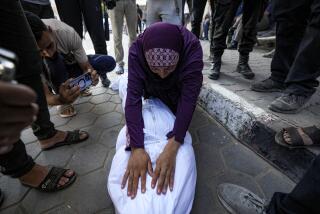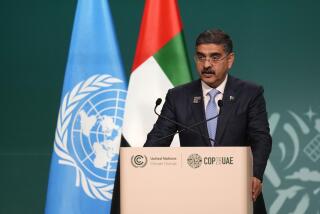Muslim Rebels Down Indian Copter
- Share via
NEW DELHI — Muslim guerrillas using a shoulder-fired missile destroyed an Indian helicopter Friday as India and Pakistan continued to battle along their border in the disputed Kashmir region.
Four Indian soldiers died in the missile strike, and Indian forces stepped up air raids and ground assaults against infiltrators who have taken up positions along the mountainous frontier with Pakistan.
Indian officials on Friday said the latest provocation from the Pakistani-backed guerrillas would not shake their resolve to refrain from hitting targets across the border, but they indicated that their patience was wearing thin.
“The Pakistanis are provoking us to escalate,” Vice Air Marshal S. K. Malik said after the incident. “The world should know that we are going to examine other options.”
The downing of the helicopter came a day after Pakistani forces shot down an Indian air force jet they said had entered Pakistani airspace. Another Indian plane went down in Pakistan the same day; the Pakistanis maintained they shot it down, though Indian officials blamed mechanical problems.
Pakistan has handed over the body of a pilot from one of the downed jets, Indian officials said today.
The downing of the aircraft, and the earlier infiltration of an estimated 600 Muslim fighters into India from Pakistan, has prompted fears of a wider war between two states that only last year tested nuclear weapons. The Indian forces’ apparent decision to not strike targets in Pakistan following the downing of the jets was a hopeful sign Friday.
The rest of the day’s events, however, suggested an intensifying conflict.
The use of a shoulder-fired antiaircraft missile marked a significant escalation of the fighting in Kashmir--and was further proof, Indian officials insisted, that Pakistan backs the guerrillas. The missile’s short range suggested that it was fired from inside India, and a Kashmiri militant organization called the United Jihad Council took credit for downing the helicopter. In nine years of insurgency inside Kashmir, a divided region claimed by both nations, Friday marked the first time that such a missile had been used.
Indian officials said the missile was a U.S.-made Stinger, but that claim could not be independently verified. The U.S. government provided hundreds of Stinger missiles to rebels in Afghanistan who were battling Soviet troops in that nearby Southwest Asian nation during the 1980s, and Afghan fighters have joined the Kashmiri struggle against India. Many of the unused Stingers were never recovered.
Despite the missile attack, Indian officers said Friday that their campaign to crush the infiltrators was making progress. They put the number of guerrillas killed at more than 200.
“Areas occupied by Pakistan-supported infiltrators are rapidly shrinking,” Indian Maj. Gen. J. J. Singh said.
Officials from India and Pakistan said they had repulsed ground attacks along the disputed border. Heavy artillery fire lighted up the skies along the 450-mile Line of Control that cuts across Kashmir. In Pakistan, residents in the northern city of Muzaffarabad reported seeing heavy troop movements. Pakistani officials said India had moved as many as 15,000 troops to northern Kashmir. A Muslim guerrilla leader said in an interview that his men were holding up well under the Indian assaults.
“We are holding positions on top of the mountains, and now the Indian convoys have been blocked,” said Syed Salahuddin, chairman of the Hezb-ul Moujahedeen, considered one of the best-armed guerrilla organizations.
The fighting began May 9, when Indian troops discovered that several hundred militants had captured mountain positions in an area claimed by India. Those positions are vacant for much of the year, though occupied by Indian soldiers once the snows melt.
Muslim insurgents, backed by Pakistan, have been battling Indian rule in Kashmir since 1990. The predominantly Muslim region has been split between India--which has a Hindu majority--and Pakistan--which is dominated by Muslims--since the two countries gained their independence from Britain in 1947. India and Pakistan have gone to war three times, twice over Kashmir.
Pakistani leaders deny any role in the current guerrilla incursion, but Western experts said such a massive venture--undertaken at altitudes of 15,000 feet--would have been difficult to carry off without the support of the Pakistani military.
“The Pakistanis want to internationalize the issue to get a settlement in Kashmir,” said Stephen P. Cohen of the Brookings Institution in Washington.
Many experts discounted the likelihood of a full-scale war, though others said the conflict could escalate. George Perkovich, who has written a book about India’s nuclear program, said the mere hint that one side might be deploying nuclear weapons could be enough to incite the other.
“All it takes is a rumor,” Perkovich said. “Neither side would have the intelligence capability to verify it.”
Friday marked the first anniversary of Pakistan’s first nuclear tests, an occasion that was celebrated throughout the country as “A Day to Praise God.”
*
Kamal Siddiqi in Karachi, Pakistan, contributed to this report.
More to Read
Sign up for Essential California
The most important California stories and recommendations in your inbox every morning.
You may occasionally receive promotional content from the Los Angeles Times.










